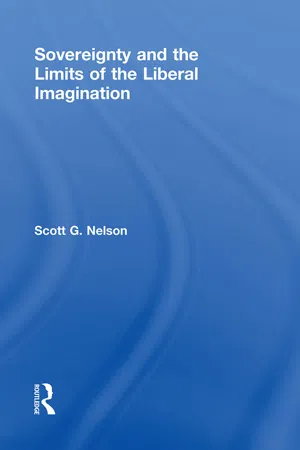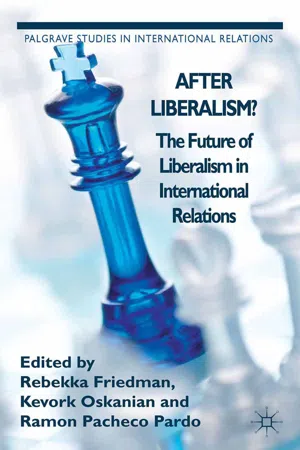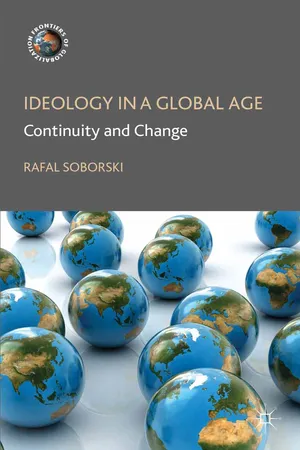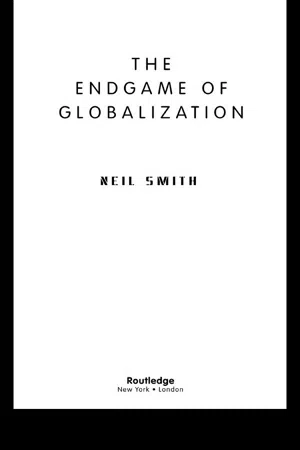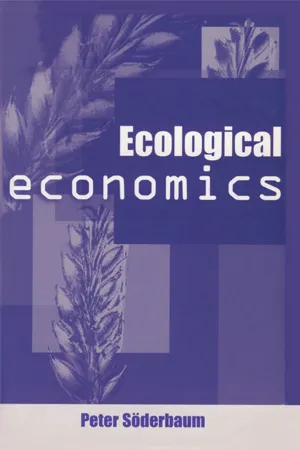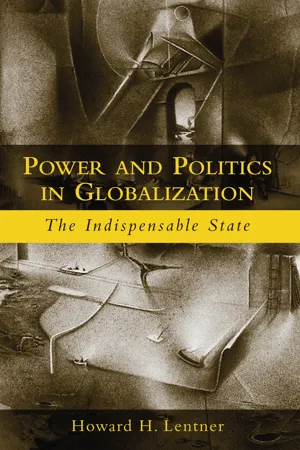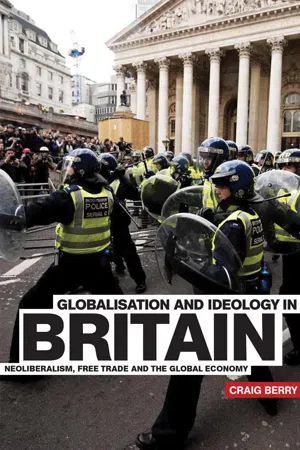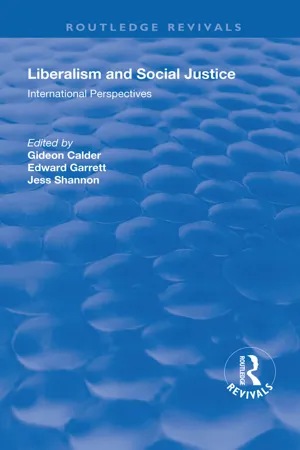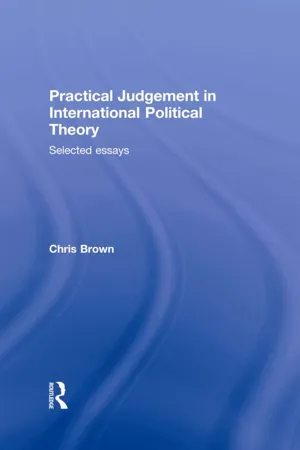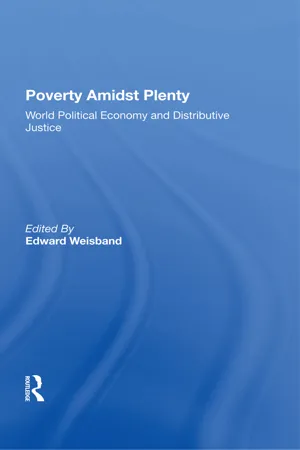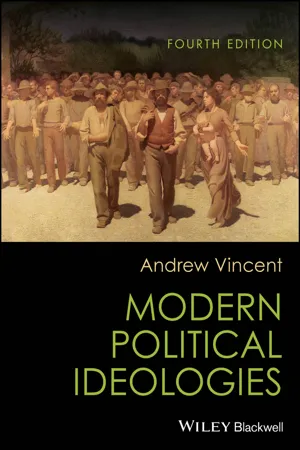Politics & International Relations
Liberalism and Globalisation
Liberalism and globalization are interconnected concepts in the realm of international relations. Liberalism emphasizes individual rights, free markets, and international cooperation, while globalization refers to the increasing interconnectedness of the world through economic, political, and cultural exchanges. The spread of liberal ideas and policies has been closely linked to the process of globalization, shaping global governance and economic systems.
Written by Perlego with AI-assistance
Related key terms
Related key terms
1 of 4
Related key terms
1 of 3
12 Key excerpts on "Liberalism and Globalisation"
- Scott G Nelson(Author)
- 2009(Publication Date)
- Routledge(Publisher)
3 Political liberalism and international relations Globalization as necessity: a problematization Globalization is a term in wide circulation in the West that variously refers to a process of making One, of inter-linking disparate and once well walled-off spheres of knowledge, labor, production, and distribution. It is a term used by some to denote dramatic reductions in transaction costs on the flows of capital, commodities, labor, services, and information in the networking global economy, the soon-to-emerge globalopolis. It imagines a world which itself may one daydream of a unique nationalism all its own, a world that will have thoroughly transfigured politics and community and, indeed, reconstituted history, progress, and human freedom. The term, in brief, invokes a series of processes inextricably bound to capitalism, liberalism and (late) modernism. Few deny the centrality of these three “-isms” to globalization’s “processes” – indeed, to its very naming. And few deny the power of market liberalization that seems to be everywhere scripting new conceptions of politics and community, solidarity and collective action, autonomy and agency. But the very conditions of capitalism, liberalism and modernity are only vaguely acknowledged as necessary to the processes of globalization – to its naming, yes, but also to ongoing articulations of political community which are producing new ethico-political relations- eBook - ePub
After Liberalism?
The Future of Liberalism in International Relations
- R. Friedman, K. Oskanian, R. Pachedo Pardo, R. Friedman, K. Oskanian, R. Pachedo Pardo, Kenneth A. Loparo, R. Friedman, K. Oskanian, R. Pachedo Pardo, Ramon Pacheco Pardo(Authors)
- 2013(Publication Date)
- Palgrave Macmillan(Publisher)
In the second section of this chapter, I will therefore try to recapture the core of liberalism by bridging the very divisions that lead to these partial conceptions. To this end, I will return to John Locke’s pre-disciplinary formulation of protoliberal principles, which explicitly theorise the connections between their core aspects and their political dynamics. This Lockean account of liberalism and its political dynamics, moreover, is broadly substantiated by the historical development of liberalism.Viewed through the lens of this alternative concept, recent history shows neither a “rise” nor a “fall” of liberalism. Instead, the shifts that undoubtedly characterise this period simply indicate liberalism’s adjustment to the power political opportunities and constraints provided by the international system. In short, they are shifts in form rather than substance. What comes “after liberalism”, I therefore conclude, is simply a different register of liberalism.Liberalism – DividedDuring the 1990s, a wide range of policies was prominently associated with liberalism. Among them were the liberalisation, deregulation, and privatisation of the international economy, the development of the World Trade Organization (WTO), and the transformation of former communist into capitalist states – in short, neoliberal economic policies. Proactive democracy promotion, as well as the widespread attempt to establish liberal market democracies as solution to failed, conflict-ridden, or even simply authoritarian states played an important role in the foreign policies of liberal states, of NGOs, and of international organisations and institutions, and gave rise to the notion of “liberal peacebuilding”. Liberalism was also associated with the proactive protection of human rights, not least in the form of humanitarian intervention as well as with plans to reform international law and international organisations in accordance with “a world of liberal states” (Clark, 2009; Keohane, 2003; Slaughter, 1995).In contrast to this spread of liberal norms, practices, and institutions, power politics generally associated with realism characterised the prior Cold War period. Capitalism, free trade, and free market principles were confined to the Western sphere of influence and tempered, domestically and internationally, by considerations of political stability. Democracy promotion was equally restricted and generally trumped by power political considerations; hence extensive alliances with authoritarian states and interventions in support of sympathetic rather than democratic regimes predominated. Human rights were generally subordinated to the principle of sovereignty. In short, the “rise” of liberalism was associated with the increase in policies explicitly designed to spread liberal norms, practices, and institutions. And it was the retreat from these policies towards the end of the 1990s and a more explicit turn towards traditional power politics after 9/11 that seemed to indicate a “fall” of liberalism. - eBook - ePub
- Bruce Russett(Author)
- 2011(Publication Date)
- Routledge(Publisher)
11LIBERALISM
The most important transformation in world politics over the past sixty years derives from the concurrent and interlinked expansion of three key phenomena associated with liberalism and its emphasis on the potentially peace-promoting effects of domestic and transnational institutions. One is the spread of democracy throughout most of the world. A second is the multiple networks of communications, trade, and finance often summarized as globalization. The third is the multiplication of intergovernmental organizations, especially those composed primarily of democratic governments. Each of these supports and extends the other in a powerful feedback system envisioned by Immanuel Kant. Moreover, each creates a set of norms and interests which dramatically reduce the risk of violent conflict among the countries so linked. Contemporary Europe constitutes the prime example of these processes at work, but they are not limited to Europe or to developed economies.The world is full of testimony to tragedy. Governments oppress their own people and commit aggression against their neighbors. World politics is conducted in a condition of anarchy as that term was used by the Greeks: not chaos, but “without a ruler,” having no overarching authority to enforce order. There is some order, but on a globe far from ready for world government most order is not something imposed from above.Realists say that every country is potentially an enemy of every other—intentionally or not, a threat to their security and very existence. In the absence of a world state they are caught forever in this precarious condition of freedom and risk. This tradition, like the anarchy that underlies it, has a history from Thucydides, Niccolo Machiavelli, and Thomas Hobbes, and shapes the perspective of many policy-makers. Yet there are restraints on the use of force. States do not fight all others even when purely realist principles dominate; they are constrained by geography, the coincidence of national interests expressed in alliances, and the balance of power. Deterrence forms the heart of survival, but deterrence—and especially nuclear deterrence—is an uncertain and dangerous way of avoiding war. Treating all international politics as unending struggle, and everyone as a potential enemy, risks becoming a self-fulfilling prophecy. - eBook - ePub
Ideology in a Global Age
Continuity and Change
- R. Soborski(Author)
- 2013(Publication Date)
- Palgrave Macmillan(Publisher)
Classical liberal prescriptions employed in the eighteenth and nineteenth centuries to defend the bourgeois economic system thus foreshadow an analogous assortment of arguments that are mobilized today to make the case for the globalization of this order. The enduring logic of this theodicy of a seamless global economy provides ample evidence for the relevance of classical liberalism as an ideological category. But the continuity claim can be substantiated yet more conclusively by demonstrating the dependence of this economic model on broader liberal beliefs. The faith in the possibility and benevolence of the globalization of free markets is articulated in this cluster of interpretations in connection with ideas that are of fundamental significance in the ambit of classical liberalism, notably individualism, universalism and an unwavering belief in progress. The following section provides a few examples of the continuing salience of these principles and sheds light on how embedded the classical liberal concept of globalization is in the broader and long-lasting liberal worldview.The liberal ontology: Individualism, universalism and progressThat classical liberalism constitutes an individualist philosophy is a definitional truism as well as a paradigmatic proclamation of classical liberals themselves, and a charge repeated by their critics from Marx to contemporary communitarians. Liberal individualism implies that, to cite Robert Eccleshall’s succinct description, ‘what is essential to human existence does not depend upon social relations’ (2003a: 27). The liberal notion of social contract means that individuals enter social relations because they find it convenient to do so. At the same time, the individual self is ‘independent of and logically prior to the community in which it resides’ (Eccleshall 2003a: 28) and social structures and relations that result from voluntary contracts are maintained by a sum of individual actions rather than some higher holistic principle.The idea of the individual unencumbered in social relations is linked with the liberal emphasis on the unity of human nature. Accordingly, individual selves, whatever specific culture they happen to inhabit, share features that are constitutive of their humanity. The characteristics common to all people are the only ones that really matter and so it is to them that liberalism tends to relate in its anthropology. On the other hand, the differences observable between human beings result from arbitrary and superfluous cultural impositions rather than being innate or essential to the true character of any individual. In short, human nature is the same at all times and in all places; liberalism proclaims itself capable of discovering its qualities, responding to its most fundamental needs and helping release its full potential. - eBook - ePub
- Neil Smith(Author)
- 2005(Publication Date)
- Routledge(Publisher)
2 LIBERALISM AND THE ROOTS OF AMERICAN GLOBALISM… a remarkable force: this fixed, dogmatic liberalism of a liberal way of life.Louis Hartz, 1955Liberalism in the latter part of the twentieth century was broadly seen to be progressive, on the right side of history. Liberals opposed the cold war and imperialism, were against racism, reviled oppression, and saw themselves as marking progress beyond a stodgy, heartless, out-of-date conservatism; they supported social welfare for the poor, feminism and civil rights, self-rule for colonial peoples, environmental politics, even—within limits—unions. They supported individual liberties and social equality, opposed corporate capital when it over- stepped its bounds, and generally believed in government regulations against the predations of a capitalist market when it threatened to run amuck. Above all else, liberalism was pitted against a conservatism that seemed to defend the rights of established class, race, and gender power. Liberalism opposed both a feudalism that preceded it and a fascism and communism that arose at different moments on the same watch.This slant on liberalism took its cue from the evolution of a specifically American politics in the twentieth century, but powerful as it was, it was not the only take on liberalism. When people in Latin America and Europe began to recognize as “neoliberal” the global economic policies of the Thatcher, Kohl and Reagan-Bush governments, their successors, and the World Bank and IMF in the 1980s and 1990s, they conjured up a much longer, deeper and broader tradition of liberalism than recent US definitions encompass. They recognized the connections between post-1970s global economic ideologies extolling the global marketplace and the social and intellectual revolutions of the seventeenth and eighteenth centuries that ushered in a new political economy of bourgeois property rights, market power, and the rule of national states. This “classical liberalism,” they perceived, was often integral with, rather than antagonistic to, latter day conservatism, and neoliberalism deliberately harkened back to that classical tradition. - eBook - ePub
Ecological Economics
Political Economics for Social and Environmental Development
- Peter Soderbaum(Author)
- 2013(Publication Date)
- Routledge(Publisher)
If democracy is accepted as a meta-ideology that establishes the ‘rules of the game’ for political action and interaction, then the next question becomes one of clarifying the demands on decision processes to make them compatible with democracy. Although there is a generally high degree of consensus about the meaning of democracy in most respects, there are also some differences that deserve attention. Returning once more to CBA as our example, this approach is built on a specific idea of democracy which, as I see it, does not go well with what I understand as being the dominant, more egalitarian, idea of democracy.LIBERALISM AND ITS RELATIONSHIP TO ECONOMICSIt has previously been argued that it is not realistic for an economist to claim value neutrality. To claim value neutrality while writing about political ideologies is perhaps even less reasonable. Some degree of honesty and openness with respect to one’s own values and an ambition to illuminate an issue from many angles are more appropriate aspirations.Liberalism focuses very much on the individual and her or his capacity for self-fulfilment. A ‘minimal state’ is sometimes advocated – which makes critics speak of ‘asocial liberalism’ – but the more common tendency is to point in the direction of a ‘social liberalism’, relegating the role of the state to one of promoting a degree of equality and social security.Liberalism is built on a set of fundamental political rights and freedoms: freedom of speech, freedom of religion and freedom of organization as well as the right (and even encouragement) to vote and otherwise express one’s political opinion are examples of this. Furthermore, liberals are reformists who believe in representative democracy. Political debate is seen as a form of learning by interaction and a way of arriving at well-informed decisions.When it comes to organizing the economy, liberals are in favour of private property. More socially inclined liberals are ready to attribute some role of ownership and control to the population at large, represented by ‘state’ and ‘municipalities’, and therefore advocate a mixed economy (as opposed to an extreme market economy on the one hand and a socialist state economy on the other). John Maynard Keynes (1883–1948), the renowned economist, was also a member of the Liberal Party in Britain. He was among those who in the 1930s advocated a mixed economy ‘in which the state assumes overall management of investment and consumption, while leaving production in the hands of private enterprise’ (Eccleshall, 1994, p54). In the same period, the so-called Stockholm School of Economics, with Bertil Ohlin as one of the more prominent members, was active and held similar views. Ohlin later became the leader of the Liberal Party (Folkpartiet) in Sweden. - eBook - ePub
Power and Politics in Globalization
The Indispensable State
- Howard H. Lentner(Author)
- 2004(Publication Date)
- Routledge(Publisher)
1
Globalization and Politics
Introduction
The politics of globalization includes two dimensions. The first embodies the practical distribution of power and the constraints imposed by existing arrangements. Those constraints flow from choices that have established and now manage existing structures and processes. The second dimension embraces a more visionary quest for alternative arrangements in the future.As is true of all politics, both cooperation and struggle are involved, domination and resistance are evident, and contestation abounds. This book deals with present realities and future visions, with both cooperative and conflictive aspects of globalization, and with issues of power and domination in the contemporary world. Certainly, substantial changes have occurred and continue to occur in the modern world. Nevertheless, in my opinion, both the realities and the visions express a good deal of continuity with the past.Globalization is most commonly presented as an inexorable process that involves bringing the world together through technology. Although the fundamental processes bringing human beings into contact with one another have been at work for millennia, high-speed transport and especially the computer have speeded up the process in the last quarter century or so. Travel, trade, and financial flows now characteristically flow across the globe in voluminous amounts at rapid rates.These developments are commonly regarded as transforming the world in which we live, but there are four basic assertions about globalization that either restate or modify received ideas about liberal thought. Foremost among the claims is that the state is losing power to the market and has been or will be modified in fundamental ways. This contention restates the Lockean position that society and market relations precede the state. Another claim holds that communities are breaking down and that individuals are becoming increasingly isolated. Traditional liberalism is founded on the notion that rational individuals formed contracts and constituted civil society, which Locke equated with the state. With the increase of the market and other contractual relations, traditional communities and societies faded before free thought in which different ideas of morality and reason emerged, and individuals were no longer constrained by social conventions and traditions. - eBook - ePub
Globalisation and Ideology in Britain
Neoliberalism, free trade and the global economy
- Craig Berry(Author)
- 2013(Publication Date)
- Manchester University Press(Publisher)
IFSL’s discourse on globalisation also emphasised the role of private economic actors. TNCs embody globalisation; they populate the global economy, unconnected to particular nation-states. IFSL recognised technological change but saw the activities of TNCs as the primary cause of change. Even more so than New Labour, IFSL treated globalisation as synonymous with liberalisation – and development was treated as little more than an acceptance of trade and investment liberalisation. Again, a liberal trade orientation was not treated as a policy choice but rather as an inevitable product of economic forces. Although IFSL was slightly less likely than New Labour to refer to globalisation and notions of globality, a sense of spatial change was equally important: the global economy was deemed to exist in a novel space, epitomised by the intangible financial services sector. As such, the concept of ‘the offshore’ was important to IFSL discourse – applied not only to tax havens or countries with low production costs, but also global financial centres such as London. As in New Labour’s discourse, the global space was seen as an economic realm. Institutions like the WTO were conferred with only outcomes-based legitimacy – bilateral and unilateral liberalisation measures were valorised where the same outcomes could be achieved.The Liberal Democrats’ discourse emphasised technological change and business innovation as features of globalisation. These phenomena had created a global marketplace, which was presented as positive. Yet the Liberal Democrats’ discourse suggested more unease about the relationship between globalisation and free trade than the other cases. While generally supportive of government policy, the party was relatively silent on, for instance, the Singapore issues. Whereas New Labour and IFSL saw globalisation as the embodiment of free trade (even if not always articulating this view explicitly), there was a stronger sense within the Liberal Democrats’ discourse that the global economy is a product - eBook - ePub
Liberalism and Social Justice
International Perspectives
- Gideon Calder, Edward Garrett(Authors)
- 2017(Publication Date)
- Routledge(Publisher)
12 Liberal State and Polity in the Era of Globalisation: Social Injustice, Governance and Resistance in the Global-Local Nexus MAJID YARIntroduction
Over the past decade the concept of 'globalisation' has become common currency, figuring in debates both in academia and in the wider public arena. 'Global speak' is increasingly becoming a part of the phenomenological and discursive reality of Western societies. In this paper I wish to explore one strand of the complex and multifaceted character of globalisation, namely its role in the generation of patterns of social inequality and injustice, and the possible and emergent forms of political mobilisation and resistance against such global processes. Substantively, I will propose two arguments. Firstly, that the specifically global genesis of patterns of inequality/injustices presents a challenge to liberal-democratic politics which has traditionally focused on the nation state as a form and avenue of political action. I argue that the globalised character of such economic, environmental and cultural processes exceeds the interventionary capacity of the nation state as a level of political organisation. Secondly, I challenge the formulation that the most appropriate response to globally generated inequalities, and the attendant 'crisis' of national politics, is simply a 'scaling-up' of political discussion, organisation and mobilisation to a global level via transnational political actors and agencies, a 'solution' associated with recent advocacy of 'global civil society'. I argue that coterminous with the emergence of global forms of political association and mobilisation we can simultaneously see the revivification of localist and contextually embedded forms of social and political movement, as the negative and inegalitarian effects of global processes impact upon specific locales and meet with resistance. In conclusion, I argue that patterns of inequality and injustice generated by global processes appear to be inciting forms of political resistance at both - eBook - ePub
Practical Judgement in International Political Theory
Selected Essays
- Chris Brown(Author)
- 2012(Publication Date)
- Routledge(Publisher)
This ‘liberal expectancy’, to use Daniel P. Moynihan’s term, was given its most dramatic expression in Francis Fukuyama’s account of the ‘end of history’, but it can be found in many of the more sober accounts of globalization. 33 This is too big a topic to address properly here, but there are a number of reasons to resist this argument, beginning with disbelief in the capitalization of history and ending with skepticism that figures such as Rupert Murdoch are actually propagating liberal values in the world. More to the point perhaps, the history of the last ten years suggests that globalization produces its own anti-bodies, resistance movements that are by no means liberal, and that there are ways of being modern that are profoundly anti-liberal - one need look no further than the ultra-modern figure of Osama Bin Laden to make the point. 34 Still, what cannot be denied is that some of the processes of globalization, especially those involved with the emergence of global markets, global business enterprises and global branding, do propagate some liberal values, and thereby constitute a form of intervention - and, perhaps, a more effective form of intervention than that associated with conscious policy decisions by liberal states or groups. This is liberal intervention without the direct agency of liberals, resistance to which is difficult to organize precisely because of this lack of agency. Liberalism, global ethics and law Liberalism has always been associated with the rule of law both domestically and internationally, although liberal thinkers have rarely made a fetish of law, and are open to the suggestion that unjust laws need not be obeyed. This point is of particular relevance when it comes to conventional international law, with its statist bias - eBook - ePub
Poverty Amidst Plenty
World Political Economy And Distributive Justice
- Edward Weisband(Author)
- 2019(Publication Date)
- Routledge(Publisher)
This firm belief that markets foster collective efficiency through private egoism represents the conceptual key to liberalism and suggests why this perspective so closely identifies competitive economic freedom with efficiency and, ultimately, with distributive justice. Herein lies the logic of values embedded within the Liberal International Economic Order: Markets are the means to national economic efficiency; national economic efficiency is the means to world economic productivity and international prosperity; and international prosperity is the optimal means for achieving international distributive justice. As Camps and Gwin observe, the Liberal International Economic Order has introduced regulatory policy mechanisms specifically geared to the expansion of international distributive justice, but only in limited and highly abbreviated ways.Regulatory policies within the Liberal International Economic Order have, as a result, aimed at the following objectives:- coordination among states of trade and monetary policy by means
- of the General Agreement on Tariffs and Trade and the International Monetary Fund, the two main intergovernmental organizations of the Liberal International Economic Order;
- promotion of nondiscriminatory trade practices;
- free circulation and convertibility of currencies in foreign exchange markets and balance-of-payments stability; and
- encouragement of private enterprise and development of market-oriented economies.
Behind these policies stand the classical and neoclassical doctrines of free trade liberalism, which will also be discussed in Reading #29 .—E.W.Today, four main normative principles (or perhaps, more precisely, simply desiderata) attract strong support when considering the procedures, rules, and other institutional arrangements that should govern economic interaction at the international level. For short, these desiderata can be called efficiency, equity, autonomy, and order (not in the sense of “system” but in the sense of predictability, stability, and reliability). Tension and incompatibility among the four instantly appear if any one of them is given an overriding importance, and much of the argument in international forums today arises because countries differ on their relative importance. It seems clear enough that rules and procedures needed at the global level will not command sufficient support to be widely honored unless they go some way toward satisfying each of these rather different desiderata. It is therefore worth looking more closely at some of the arguments.* - eBook - ePub
- Andrew Vincent(Author)
- 2023(Publication Date)
- Wiley-Blackwell(Publisher)
2 LiberalismLiberalism is the most complex and intricate of ideologies. It has permeated so deeply into the cultural life of the West that it is difficult to disentangle the partisan from the more objective commentary. Much academic study (in fact the notion of the liberal academic mind) is founded on the assumptions of tolerance or diversity. A great deal of contemporary political philosophy in the Anglosphere, specifically in the writings of figures such as John Rawls, Michael Walzer and Friedrich Hayek, deals largely with liberal themes.The oldest apolitical use of the word ‘liberal’ denotes a type of education. From the Middle Ages it implied two things: first, a broad or wide‐ranging education; second, the education of a gentleman and freeman (liber). We have not lost the first sense of the term, although it seems to come into periodic disfavour in educational and political circles. The notion of a ‘liberal education’ is now often strongly linked with the disciplines of the humanities. The liberal education is said to cultivate a certain critical disposition or habit of mind. Yet the term can be complimentary or pejorative. The complimentary sense implies broadmindedness or generosity (the latter is more easily caught in the word liberality), seen as a virtue. From the late sixteenth century there was another sense of the term which was opprobrious, namely, where liberal implied licence. This is close to the word libertine, which from the sixteenth century implied not only sexual licence and lack of regard for moral laws, but also addiction to antinomian opinions in religion. In Shakespeare’s Othello, when Desdemona refers to Iago as ‘a most profane and liberal counsellor’, she was not, we can assume, complimenting him. This opprobrious, more abusive sense of liberal is still in use today.A third sense identifies the concept ‘liberal’ with certain kinds of moral values. In other words, there are a series of values (tolerance, progress, liberty, individualism) which long pre‐date the word
Index pages curate the most relevant extracts from our library of academic textbooks. They’ve been created using an in-house natural language model (NLM), each adding context and meaning to key research topics.
Explore more topic indexes
Explore more topic indexes
1 of 6
Explore more topic indexes
1 of 4
